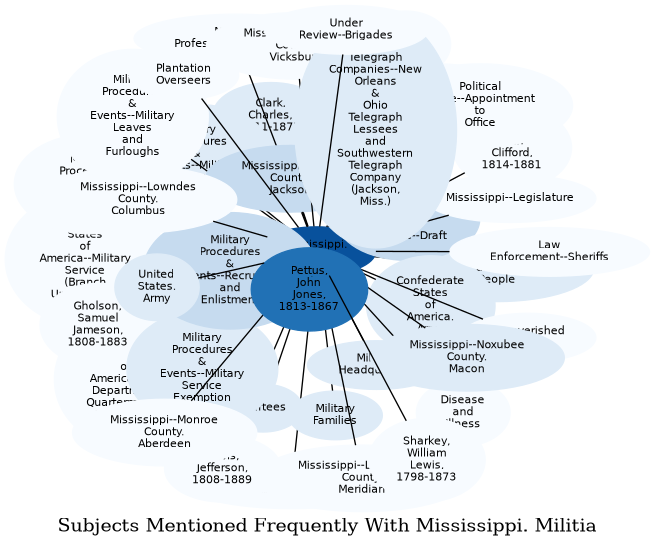Description
A militia is a military unit made up of civilians within a community who could be called up by local (often state) officials to serve temporary military purposes. Militias were separate from regular, or permanent, armies. Because they conducted training only periodically, and provided active military service for short periods of time, militias cost less than regular armies; and because they were manned by local residents, militias were frequently seen as less threatening to early American communities than national military units comprised of strange men born in other counties or states.
When Mississippi seceded in 1861, enthusiasm for military service swept across the state. Volunteers filled the ranks of old militia units or created new companies within their communities, eager to repulse any federal attempt to coerce secessionists back into the Union. They also took proactive efforts, securing key positions along the Gulf Coast, including reinforcing other Southern soldiers at Pensacola and Fort Pickens in Florida. Over the next few months, as the Confederate government requested more volunteers, thousands of Mississippians and entire volunteer companies from the state transferred to Confederate service and were sent north, out of state. The units that remained within Mississippi for state defense were left in a convoluted military structure, some considered state reserves (a more formal military force for state defense) and some considered state militia (the more traditional units of citizen-soldiers called up for local, emergency use). The distinctions were not well established, and during the war Mississippians describing state units not within the Confederate army used a variety of terms—such as militia, home guard, state troops—almost interchangeably. However, under this subject tag at CWRGM you will find references to the militia and state troops; references that specifically referred to the home guard can be found separately under the Mississippi Home Guard subject tag.
While militia and state defense units technically fell under the governor’s authority, the state government struggled to manage, or even track, these organizations. Some, like the Third Battalion Mississippi Minute Men, were well organized, fell under direct state control, and took part in larger military operations, such as the defense of Vicksburg; others saw no combat, rarely gathered for drill, and were entirely overseen by county or local community officials. Most militia members were older than the average Confederate soldier. They were typically farmers, business owners, or land owners who had families and, in many instances, slaves. Because of these responsibilities at home, militiamen expected their military duties to be periodic, temporary, and only during times of emergency, a reflection of the militia’s original intent. However, state officials occasionally activated militia units for long periods, based upon the military situation. In the summer of 1862, Mississippi’s governor, John J. Pettus, mobilized his state troops, pulling many militia units away from their communities. Held in camp for several weeks, drilling but not seeing combat, many militiamen complained of their treatment and argued that their services were needed more at home, managing farms and their communities. Despite these complaints, the governor mobilized the state troops again in 1864, and again met criticism.
Overall, Mississippi’s militia and state defense system during the Civil War was a complicated tangle of formal and informal military units. Infrequently used for combat assignments, these units nevertheless provided some emergency services for the state government and allowed many Mississippians a way to provide military service to the community while remaining at home to manage personal and local interests. (Tracy L. Barnett, “Mississippi ‘Milish’: Militiamen in the Civil War,” Civil War History, Vol. 66, No. 4 (Dec 2020), 343-379; Michael B. Ballard, The Civil War in Mississippi: Major Campaigns and Battles, 4-8)
Related Subjects

The graph displays the other subjects mentioned on the same pages as the subject "Mississippi. Militia". If the same subject occurs on a page with "Mississippi. Militia" more than once, it appears closer to "Mississippi. Militia" on the graph, and is colored in a darker shade. The closer a subject is to the center, the more "related" the subjects are.